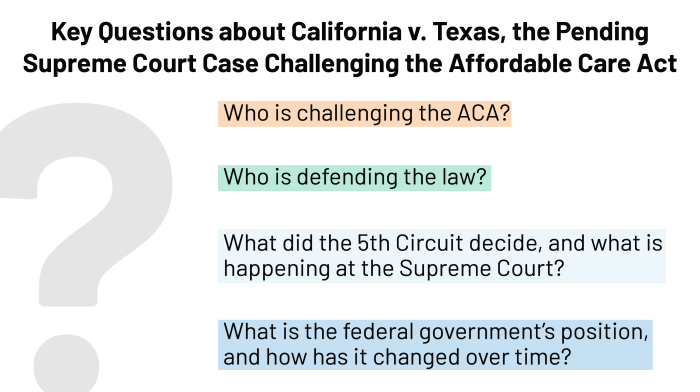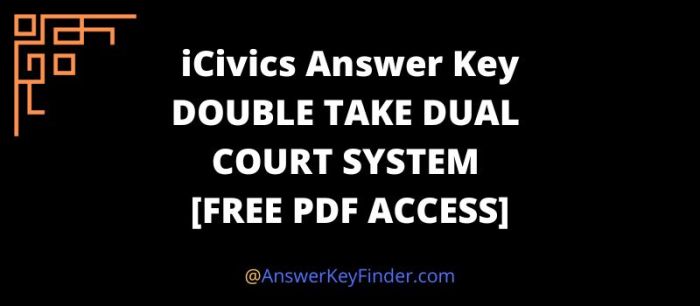Icivics double take dual court system – iCivics Double Take: Dual Court System delves into the intricacies of the American judicial system, shedding light on its unique structure and the profound impact it has on our society. This comprehensive program offers a captivating exploration of the dual court system, empowering learners with a deeper understanding of its historical foundations, practical applications, and potential for reform.
Through interactive activities and thought-provoking discussions, iCivics Double Take illuminates the complexities of the dual court system, fostering critical thinking and civic engagement. By examining landmark cases and comparing the system to its counterparts worldwide, this program equips individuals with the knowledge and skills necessary to navigate the legal landscape with confidence.
Dual Court System: Icivics Double Take Dual Court System

The dual court system is a system of courts that divides the judicial power between the federal government and the state governments. This system was established by the Constitution of the United States, which grants the federal government the power to create courts and the power to hear cases involving federal law.
The states also have the power to create courts and the power to hear cases involving state law.
Types of Courts in the Dual Court System
- Federal Courts:The federal courts are the courts that are created by the federal government. These courts have jurisdiction over cases involving federal law, such as cases involving the Constitution, federal statutes, and treaties.
- State Courts:The state courts are the courts that are created by the states. These courts have jurisdiction over cases involving state law, such as cases involving contracts, torts, and crimes.
Examples of Cases that are Heard in Each Type of Court
- Federal Courts:Cases involving the Constitution, federal statutes, and treaties are heard in federal courts. For example, a case involving a dispute over the meaning of the First Amendment would be heard in federal court.
- State Courts:Cases involving contracts, torts, and crimes are heard in state courts. For example, a case involving a breach of contract would be heard in state court.
Icivics Double Take
The iCivics Double Take program is a free online educational program that teaches students about the dual court system. The program is designed to help students understand the different types of courts in the dual court system, the jurisdiction of each type of court, and the process for resolving disputes in each type of court.
Goals and Objectives of the Program
- To teach students about the dual court system.
- To help students understand the different types of courts in the dual court system.
- To help students understand the jurisdiction of each type of court.
- To help students understand the process for resolving disputes in each type of court.
Activities and Resources that are Available through the Program
- Interactive simulations that allow students to experience the dual court system firsthand.
- Lesson plans and activities that can be used by teachers to teach students about the dual court system.
- Videos and other resources that provide students with information about the dual court system.
Court Cases

There have been several landmark court cases that have shaped the dual court system. These cases have helped to define the jurisdiction of the federal courts and the state courts, and they have also helped to establish the principles of federalism and separation of powers.
Landmark Court Cases
- Marbury v. Madison (1803):This case established the principle of judicial review, which gives the Supreme Court the power to declare laws unconstitutional.
- McCulloch v. Maryland (1819):This case established the principle of implied powers, which gives the federal government the power to enact laws that are not explicitly authorized by the Constitution.
- Gibbons v. Ogden (1824):This case established the federal government’s exclusive power to regulate interstate commerce.
- Dred Scott v. Sandford (1857):This case held that African Americans were not citizens of the United States and could not sue in federal court.
- Brown v. Board of Education (1954):This case overturned the doctrine of “separate but equal” and held that racial segregation in public schools was unconstitutional.
Comparisons
The dual court system in the United States is different from the court systems in many other countries. In most other countries, there is only one court system that handles all types of cases. The dual court system in the United States is more complex, but it also provides more flexibility and allows for a greater degree of specialization.
Advantages of the Dual Court System
- Flexibility:The dual court system allows for a greater degree of flexibility than a single court system. This is because the federal courts and the state courts can each develop their own rules and procedures, which can be tailored to the specific needs of each court.
- Specialization:The dual court system allows for a greater degree of specialization than a single court system. This is because the federal courts and the state courts can each specialize in different types of cases. For example, the federal courts often handle cases involving federal law, while the state courts often handle cases involving state law.
Disadvantages of the Dual Court System
- Complexity:The dual court system is more complex than a single court system. This can make it difficult for people to understand how the system works and how to access the courts.
- Cost:The dual court system is more expensive than a single court system. This is because the federal courts and the state courts each have their own budgets and their own staff.
Applications

The dual court system is used in practice to resolve a wide variety of disputes. These disputes can range from simple contract disputes to complex constitutional cases. The dual court system provides a fair and impartial forum for resolving these disputes, and it helps to ensure that the rights of all parties are protected.
Examples of How the Dual Court System has been Used to Resolve Disputes, Icivics double take dual court system
- Contract Disputes:The dual court system has been used to resolve a wide variety of contract disputes. For example, the federal courts have been used to resolve disputes involving contracts between businesses, while the state courts have been used to resolve disputes involving contracts between individuals.
- Tort Disputes:The dual court system has been used to resolve a wide variety of tort disputes. For example, the federal courts have been used to resolve disputes involving personal injury, while the state courts have been used to resolve disputes involving property damage.
- Constitutional Cases:The dual court system has been used to resolve a wide variety of constitutional cases. For example, the federal courts have been used to resolve disputes involving the First Amendment, while the state courts have been used to resolve disputes involving the state constitutions.
Role of the Dual Court System in Protecting Individual Rights
The dual court system plays a vital role in protecting individual rights. This is because the federal courts and the state courts can each serve as a check on the other. For example, if the federal government passes a law that violates the Constitution, the state courts can declare the law unconstitutional.
Similarly, if a state government passes a law that violates the Constitution, the federal courts can declare the law unconstitutional.
FAQ Insights
What is the dual court system?
The dual court system refers to the coexistence of two distinct court systems within a single jurisdiction, typically consisting of state courts and federal courts, each with its own set of laws and procedures.
What are the advantages of the dual court system?
The dual court system provides flexibility and responsiveness to local needs, allows for specialization in different areas of law, and serves as a check on the power of both the federal and state governments.
What are the disadvantages of the dual court system?
Potential disadvantages include the possibility of conflicting rulings, increased costs and complexity for litigants, and the potential for forum shopping, where parties seek out the court system most favorable to their case.